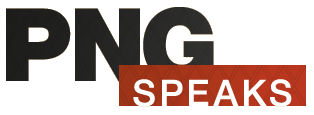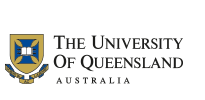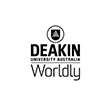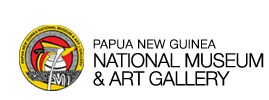Michael Somare
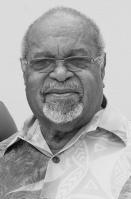
Grand Chief Sir Michael Thomas Somare was the co-founder of the pro-independence Pangu Party in 1967 and the first official opposition leader from 1968. He became Chief Minister when the country attained self-government in 1972, and went on to become the first Prime Minister of independent PNG from 1975-80. He discusses the formation of the PNG independence movement, the deliberations over a national constitution, and his personal engagement with Australian representatives and other prominent PNG leaders in the lead-up to independence.
| Time | Summary | Keywords |
|---|---|---|
| 00:00:00 |
Michael Somare is welcomed to the interview and refers to his early years. |
|
| 00:00:49 |
Michael Somare reflects on his education in Australian geography and history as the beginnings of his thinking about PNG becoming a separate country. |
Australian history, Foot Report |
| 00:02:07 |
Michael Somare recalls his decision to enter parliament, running in East Sepik electorate, after he had been an English language interpreter in the Legislative Council in 1964 where he was inspired by listening to people such as Pita Lus. |
1968 election, Pita Lus |
| 00:06:47 |
Michael Somare discusses his selection to the Administrative College in Sogeri, his qualifying for the Australian public service and the use of the Queensland curriculum and examinations in the College. |
Administrative College, Australian Public Service, education, Sogeri High School |
| 00:11:07 |
Michael Somare recalls meeting Albert Maori Kiki and talking about the formation of Pangu Party. He reflects on his decision at College to switch from a local magistrate course to become a journalist. |
Albert Maori Kiki, career, Pangu Party |
| 00:11:49 |
Michael Somare discusses regular meetings of the Pangu Party in Hohola and discussions in Albert Maori Kiki's house. |
Albert Maori Kiki, Hohola, Pangu Party |
| 00:13:38 |
Michael Somare explains the origins of the name the Bully Beef Club at the Administrative College and the visit by eminent persons Tom Mboya (author of 'Freedom and After') in 1964, the Filippino foreign minister and Les Johnson to discuss world issues. |
Administrative College, Bully Beef Club, Les Johnson, Philippines, Tom Mboya |
| 00:18:50 |
Michael Somare discusses his use of the radio network and his job as a disc jockey to get both his ideas and his name well known throughout the districts. |
communications, radio |
| 00:20:00 |
Michael Somare recalls the wage case involving Paul Munro and the Public Service Association, using radio to distribute ideas and his sudden transfer from Wewak to Port Moresby. |
Australian Public Service, Paul Munro, wage dispute |
| 00:24:25 |
Michael Somare discusses Pita Lus approaching him, due to his English language skills, to run in the East Sepik electorate at end of 1967 for the Pangu Party, which had been formed on 13 June 1966, and also the influence of Tony Voutas. |
1968 election, East Sepik Electorate, Pita Lus, Tony Vourtas |
| 00:30:11 |
Michael Somare recalls winning the 1968 election and the small group including Barry Holloway and Pita Lus who started talking to people about self government. |
1968 election, Barry Holloway, Pita Lus, self government |
| 00:32:55 |
Michael Somare outlines John Guise's origins and support as leader of the Pangu Party. |
John Guise, mixed race, Pangu Party |
| 00:35:06 |
Michael Somare explains the Compass Party and its origins and opposition to Independence, and the role of the Catholic church. |
Catholic church, Compass Party, opposition to Independence |
| 00:36:17 |
Michael Somare discusses his decision when elected in 1968 to the House of Assembly not to be a minister, but to wait. He recalls the issues of that parliament including the Matanguan situation, Bougainville, and the parliamentary committee visit to Africa with Paul Lapun and Tei Abal. |
Africa, Bougainville, First House of Assembly, Ghana, Les Johnson, Matanguan, Paul Lapun, Tanzania, Tei Abal |
| 00:39:09 |
Michael Somare outlines visits of Australians to PNG including Bob Menzies and Ceb Barnes and the latter's prediction that Independence was 30 years away. He discusses the views of the more moderate Andrew Peacock who replaced Ceb Barnes. |
Andrew Peacock, Charles Barnes, Robert Menzies |
| 00:43:48 |
Michael Somare discusses his relationship with Bougainville, and his use of his knowledge of local history to convince people to be part of PNG. |
Bougainville |
| 00:45:55 |
Michael Somare reflects on issues during the second House of Assembly including New Britain, Matanguan links, Oscar Tammur, the Pangu Party, John Kaputin and the formation of the Matanguan Party and the meaning of its name, and the land problems developing between the inland Tolais and the coastal Tolais. |
John Guise, John Kaputin, Matanguan, New Britain, Oscar Tammur, Second House of Assembly, Tolais, Vin Tobaining |
| 00:49:50 |
Michael Somare states that even though the Pangu Party was not in a formal way part of the government that he maintained an interest in broad national affairs. |
Pangu Party |
| 00:50:48 |
Michael Somare talks about issues leading up to the 1972 election and the movement for constitutional change and the visit and role of Australian Prime Minister John Gorton and Opposition Leader Gough Whitlam and his shadow ministers Kim Beazley and Simon Crean. He discusses the uncertainty around Independence caused by the Compass Party and the role of Pita Lus and the Pangu Party. |
Andrew Peacock, Compass Party, Gough Whitlam, John Gorton, Kim Beazley, Pangu Party, relationship with Australia, Royal Pacific Island Regiment, Simon Crean, Wewak |
| 00:56:22 |
Michael Somare discusses the 1972 election, the Pangu Party's policy of self government and forming a coalition with Julius Chan and the People's Progress Party. He refers to his recommendation of John Guise for Governor General. He recalls that because he and Brere Awol were both elected unopposed they were able to move around the country and assist other campaigns for the Pangu Party. |
1972 election, Brere Awol, East Sepik Electorate, Governor General, John Guise, Julius Chan, Pangu Party, People's Progress Party, Tony Vourtas |
| 00:58:08 |
Michael Somare outlines the Pangu Party policies on self government, rural development and reviewing district administration. |
Pangu Party |
| 00:59:09 |
Michael Somare discusses the issue of mixed race candidates and his support for Julius Chan, and issues of discrimination. |
discrimination, Julius Chan, mixed race |
| 01:03:08 |
Michael Somare recalls how as Chief Minister he went about the timing of self government and his statements that Independence is never given but has to be fought for, despite some people, including Julius Chan and Wally Lussick, wanting to keep the status quo. |
Julius Chan, Wally Lussick |
| 01:07:22 |
Michael Somare discusses his relationship with Les Johnson and the group of Australians who supported him. |
Les Johnson, relationship with Australia |
| 01:09:55 |
Michael Somare outlines the formation and three years work of the Constitutional Planning Committee (CPC) and the appointment of John Momis as deputy chair. He discusses the work of John Kaputin, Tony Vourtas, and Barry Holloway. He notes that, unlike Australia, a new framework of laws was needed to be developed to accommodate traditional customs and different ethnic groups and outlines the support he received from Australian legal experts. |
Bernard Narokobi, Constitutional Planning Committee, Jim Davidson, John Momis, relationship with Australia, Ron Crocombe |
| 01:16:05 |
Michael Somare discusses the work of the CPC in every district and sub-district and his insistence on a multiparty rather than presidential system. |
Constitution, Constitutional Planning Committee, John Guise |
| 01:19:25 |
Michael Somare discusses his two-step plan for, firstly, self government followed in three years by Independence. |
strategic plan |
| 01:20:27 |
Michael Somare recalls the involvement of conservatives in CPC including Tei Abal and Wally Lussick and their visit to Tanzania, Kenya, Uganda and Ceylon. He states that many Australians were worried that Independence would cause violence as had been the case in Africa. |
Africa, Ceylon, Tei Abal, Wally Lussick |
| 01:25:42 |
Michael Somare states that he developed the two-step strategy from examples in Malaysia and Singapore from the experiences of Tunku Abdul Rahman and Lee Kuan Yew. |
Lee Kuan Yew, Malaysia, Singapore, Tunku Abdul Rahman |
| 01:26:29 |
Michael Somare explains the photograph with Les Johnson when he was sworn-in in 1972, and that he held an unexpired Australian passport until 17 May 1978. |
Les Johnson |
| 01:27:39 |
Michael Somare discusses the strategy of the House of Assembly reforming as the National Constitutional Assembly to debate the constitution and give the two eras a complete legal break. He discusses how unusual it was for a colony to write its own constitution. He emphasises the role of Australian education in PNG from 1960 and the group selected to complete secondary education and join the Australian Public Service. |
Constitution, education, Les Johnson |
| 01:32:14 |
Michael Somare states that he discussed with Gough Whitlam the importance of at least 4 or 5 years of continuing Australian presence in PNG for training, and his discussions regarding ongoing financial assistance to PNG from Australia with both Gough Whitlam and Andrew Peacock. |
Andrew Peacock, Australian aid, financial aid, Gough Whitlam, relationship with Australia |
| 01:33:33 |
Michael Somare describes the preparations in the month between the Constitution being adopted and Independence including the powers transferred to PNG and the role of Albert Maori Kiki first foreign relations minister. He emphasises the importance of the Governor General not being given the power of veto, thus removing the threat of a presidential system. He states that he operated in effect as Prime Minister and discusses the guests for Independence celebrations. |
Albert Maori Kiki, defence, Ferdinand Marcos, foreign policy, Prince Charles |
| 01:39:08 |
Michael Somare describes the excitement of 16 September 1975 and the ceremony and speeches by John Guise, Prince Charles and Gough Whitlam. He discusses the advice he got to keep the armed forces numbers low so as not to create a situation as occurred in Fiji with General Rambuka. |
Fiji, Gough Whitlam, John Guise, Prince Charles, Sitiveni Rambuka |
| 01:42:52 |
Michael Somare discusses the continuing relationship with Australia and Gough Whitlam and Malcolm Fraser. |
Gough Whitlam, Malcolm Fraser, relationship with Australia |
| 01:43:45 |
Michael Somare outlines the challenges before Independence including the threat of Independence in Bougainville and the role of Momis, and keeping the predominantly Catholic Bougainville within the fold. He discusses the CPC visit to Rorovana village and confrontations during the CPC visit. |
Alexis Sarei, Catholic church, Constitutional Planning Committee, John Momis, Leo Hannett, Paul Lapun, Rorovana |
| 01:48:23 |
Michael Somare recalls the feelings around the country, including the Papua Besena movement, Josephine Abaijah and separation and the role of Albert Maori Kiki and Reuben Taureka and other Papuans and John Guise to win the hearts of people. |
Albert Maori Kiki, Governor General, John Guise, Josephine Abaijah, Papua Besena movement, Reuben Taureka |
| 01:50:00 |
Michael Somare discusses the first election after Independence in 1977, and points to the grass roots organisation of the Pangu Party. He discusses the dismantling of the Pangu Party and the challenge to get rid of him. |
Pangu Party, Supreme Court challenge |
| 01:52:50 |
Michael Somare outlines developing foreign policy based on 'a friend to all', his relationship with South East Asia and his visit to China with Albert Maori Kiki to sign a diplomatic agreement in 1976. |
Albert Maori Kiki, China, foreign policy, South East Asia |
| 01:55:24 |
Michael Somare discusses the national goals contained in the constitution and how they guided policy relating to land ownership vested in the people not the government. |
Constitution, Kennecott, land ownership |
| 01:57:17 |
Michael Somare reflects on policies on land, and equal rights for women. He talks about various women parliamentarians including Nahau Rooney and his ideas to get more women into parliament. He discusses the inherent sexism in the community but points to the election of Julie Soso Akeke in a Highlands seat. |
Julie Soso Akeke, Nahau Rooney, sexism, women |
| 02:00:13 |
Michael Somare discusses post Independence issues including mining laws, negotiating with Kennecott, BHP, ExxonMobil and issues for the economy. |
BHP, economy, ExxonMobil, Kennecott, mining, Ok Tedi |
| 02:05:05 |
Michael Somare reflects on the things that he would have done differently, including the need to review the system of local government and the difficulties of small islands like Bougainville. |
Bougainville |
| 02:06:56 |
Michael Somare talks about a Federation model for 2015-17, and his optimism for the future. He points to the need to ensure that income is distributed to the provinces and that people receive training and that skilled workers, for example mining engineers, are retained in PNG not lost to Western Australian mines. |
Federation, mining, skilled workforce |
| 02:10:21 |
Michael Somare discusses the role of women in PNG in politics and development and the number of women in the national court and in parliament. |
sexism, women |
| 02:12:53 |
Michael Somare discusses the problems of unemployment and crime in the towns from the mid-1970s, and the mistake of the government not acquiring land in towns for use as schools and health centres. He discusses the problems of squatters in towns and the problems on Lihir Island and with land registration. He remarks that he is still involved in the ongoing development issues of the country. |
crime, land ownership, Lihir Island, Ok Tedi, squatters, unemployment, Wewak |
| 02:21:04 |
Interview ends. |
Biography

Michael Somare
Grand Chief Sir Michael Thomas Somare, GCL, GCMG, CH, CF, KStJ, PC, MP
Michael Somare grew up in East Sepik Province, first attending school there during the Japanese occupation. After completing his primary education in his home province, he was selected to continue his education at Sogeri National High School. He then went on to teach at several schools, returning to Sogeri for further training from 1962-63.
Subsequently, as a radio broadcaster in Wewak, the capital of his home province, his outspoken political comments led to him being transferred to administrative roles in Port Moresby, where he developed links with other independence supporters, and co-founded the pro-independence Pangu Party in 1967.
Michael Somare successfully contested the elections for the second House of Assembly in 1968, and then became the first official opposition leader. He formed a coalition government following the third House of Assembly elections in 1972, and became Chief Minister when self-government was granted in 1973. He was a key figure in the independence negotiations, and in the preparation and adoption of the Constitution.
Somare became Prime Minister of the newly independent state of Papua New Guinea on 16 September 1975, and was re-elected to this position in the 1977 elections. Ousted by a parliamentary vote of no confidence in 1980, Somare returned as Prime Minister from 1982 until 1985. He served as Minister for Foreign Affairs from 1989-92 under Prime Minister Rabbie Namaliu.
Sir Michael Somare was elected as Prime Minister for a third term in 2002 as leader of the National Alliance party, winning re-election in 2007 and serving continuously as head of government until August 2011, when Peter O’Neill was elected as Prime Minister on the floor of Parliament in controversial circumstances while Somare was hospitalised in Singapore following a heart operation. Sir Michael recovered and was re-elected to parliament in the 2012 elections as governor of East Sepik Province.
Copyright © Papua New Guinea National Museum & Art Gallery, 2025
The copyright holder of this material grants users permission to access the material on this website for the following purposes only: research and study, education, other non-commercial and non-public uses.
